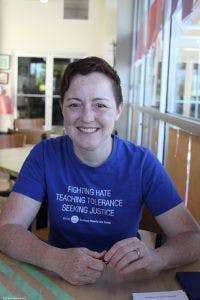The Northwest Youth Services headquarters stands adjacent to the construction developments of an affordable housing project on North State street on Tuesday, May 22. The nonprofit organization provides housing and outreach services to Whatcom County youth aged 13-24 who are experiencing homelessness. // Photo by Roisin Cowan-Kuist
Isabel Lay
“There are a lot of adults out there who want to be supportive, but they’re afraid of saying or doing the wrong thing,”
Lisa Page, coordinator for the Queer Youth Project.
Page said the treasury serves the needs of the trans community that might not otherwise be met. These resources are vital to queer youth, Page said. She said 83 percent of LGBTQ youth reported that they “feel alone in the world” and 70 percent of bisexual youth said they were experiencing depression. Page said the top driver of youth homelessness is parent or guardian rejection or neglect. “First and foremost, we try to make [LGBTQ youth] understand that what they’re going through is normal and awesome,” Daly said. “We believe in them and we support them in figuring out their path.” The project is mostly prevention focused, with advocacy as an aspect of it as well. Volunteers, along with Page, help youth advocate for themselves.“All communities are facing the issue in a different way, we’re definitely not alone in fighting this fight,”
Jenn Daly, director of development and communications at Northwest Youth Services.
Page said the project’s goal is to make sure the program won’t segregate queer youth from their peers and to train other adults to be as aware and compassionate as possible,. “On the prevention side, it’s a lot of support to help youth feel seen and comfortable and to confirm their identity and help with experiences of gender dysphoria,” Page said. “For homeless youth, it might be the difference between being able to survive or stay safe. It’s a safety mechanism.” In addition to the treasury, the goal of the Queer Youth Project and Northwest Youth Services is to ultimately get youth back in a more supportive environment, Page said. To do this, the Queer Youth Project provides 10 free counseling sessions with a queer-affirming therapist. In the session the therapist and youth talk about gender identity exploration and navigation, coping skills, communication skills, mental health issues and whether or not to come out or how to come out. “It also gives them another supportive adult in their life who they can trust and talk to,” Page said. The two additional parts of the Queer Youth Program are trainings taught by Page and a group that allows LGBTQ youth from all over the county to convene and talk about their shared experience the third Friday of every month from 4-6 p.m. in the youth room at First Congregational Church in Bellingham. “When I talk to youth about that they’re like, ‘at a church?’ and I say, ‘yeah, totally at a church.’ There are lots [of] queer-affirming churches, and two of their pastors identify as queer,” Page said. “That’s kind of a beautiful open door to another community that might be supportive for them outside of their family and outside of school.” As for trainings, Page said they have been successful in helping adults in the community learn how to help homeless youth. “There are a lot of adults out there who want to be supportive, but they’re afraid of saying or doing the wrong thing,” Page said. Northwest Youth Services is just one of many youth organizations across the nation battling homelessness head-on. “All communities are facing the issue in a different way, we’re definitely not alone in fighting this fight,” Daly said. However, all hope is not lost yet, Page said. “Individuals are going through transitions and communities are going through transitions,” Page said. “We are all part of that and it’s on us to educate ourselves and to be good advocates, to stay open to learning from other people.”




